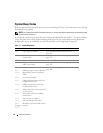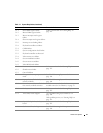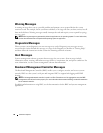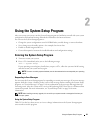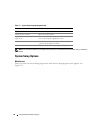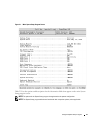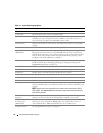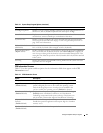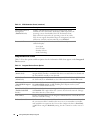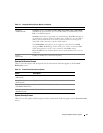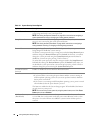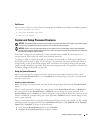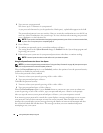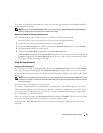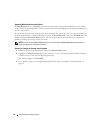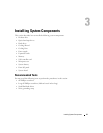
34 Using the System Setup Program
Integrated Devices Screen
Table 2-4 lists the options and descriptions for the information fields that appear on the Integrated
Devices screen.
Demand-Based Power
Management
(Disabled default)
Enables or disables demand-based power management. When
enabled, the CPU Performance State tables will be reported to the
operating system; when disabled, the CPU Performance State
tables will not be reported to the operating system. If any of the
CPUs do not support demand-based power management, the field
will become read-only, and automatically set to Disabled.
Processor 1 ID Displays the family, model number, and details for each processor. A
submenu displays:
– Core Speed
– Level 2 Cache
– Number of Cores
– 64-bit Technology
Table 2-4. Integrated Devices Screen Options
Option Description
IDE Controller
(Auto default)
Enables the integrated IDE controller. When set to Auto, each channel of the
integrated IDE controller is enabled if IDE devices are attached to the channel and
the external IDE controller is not detected.
SATA Controller
(ATA default)
Allows the integrated SATA controller to be set to Off or ATA Mode. Off disables
the SATA subsystem. ATA Mode sets the SATA subsystem to Native IDE mode.
USB Controller
(On with BIOS support
default)
Enables or disables the system's USB ports. Options are On with BIOS support,
On without BIOS support, or Off. Disabling the USB ports makes system
resources available for other devices.
Embedded Gb NIC
(Enabled with PXE
default)
Enables or disables the system's integrated NIC. Options are Enabled with PXE
and Disabled. PXE support allows the system to boot from the network. Changes
take effect after the system reboots.
MAC Address Displays the MAC address for the integrated 10/100/1000 NIC. This field does not
have user-selectable settings.
Diskette Controller Enables or disables the system’s diskette drive controller. When Auto is selected,
the system turns off the controller when necessary to accommodate a controller
card installed in an expansion slot. You can also configure the drive as Read-Only,
or Off. When using the Read-Only setting, the drive cannot be used to write to a
disk.
Table 2-3. CPU Information Screen (continued)
Option Description



